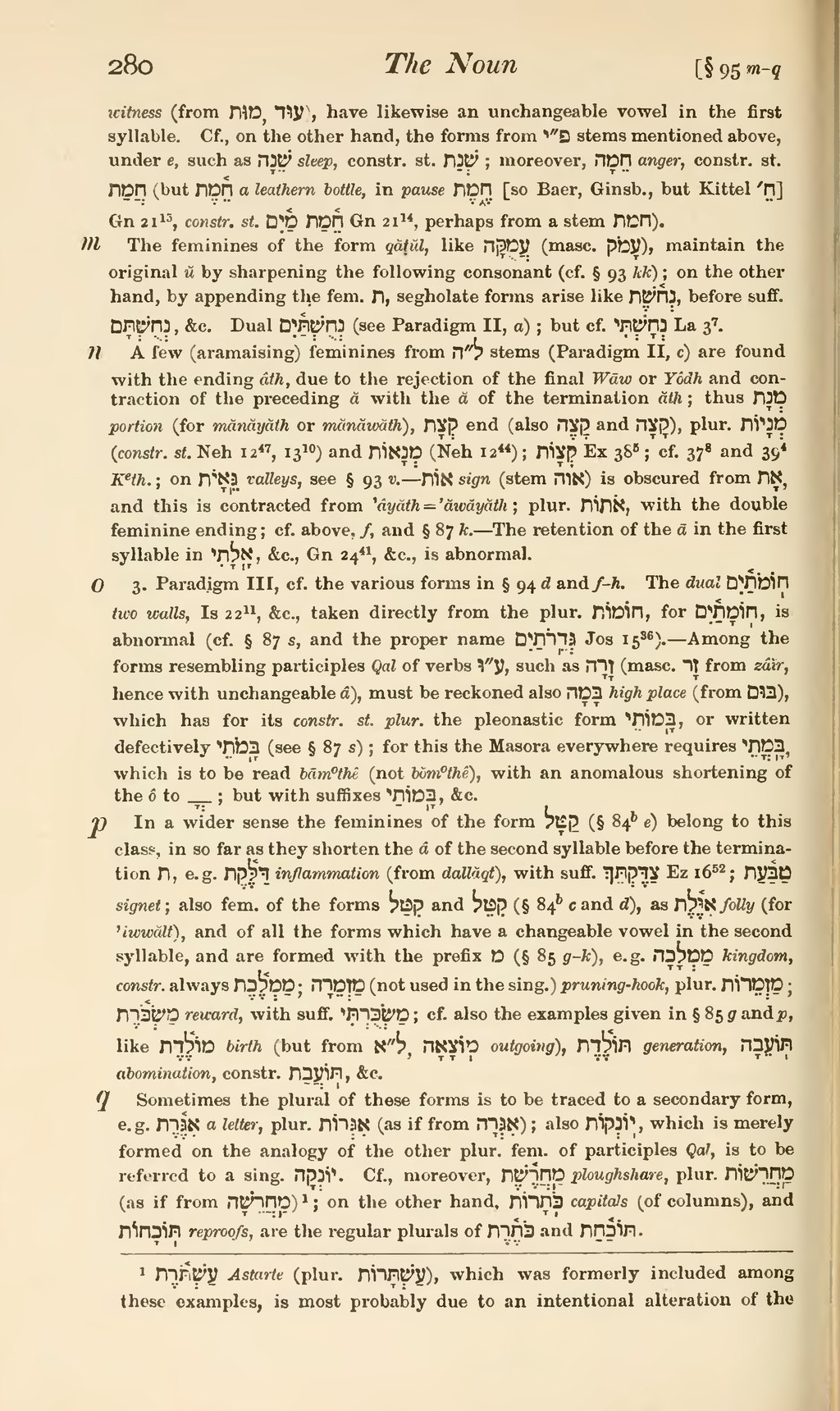witness (from מוּת, עוּד), have likewise an unchangeable vowel in the first syllable. Cf., on the other hand, the forms from פ״י stems mentioned above, under e, such as שֵׁנָה sleep, constr. st. שְׁנַת ; moreover, חֵמָה anger, constr. st. חֲמַת (but חֵ֫מֶת a leathern bottle, in pause חֶ֑מֶת [so Baer, Ginsb., but Kittel חֵ׳] Gn 21, constr. st. חֵ֫מַת מַ֫יִם Gn 21, perhaps from a stem חמת).
[m] The feminines of the form qăṭŭl, like עֲמֻקָּה (masc. עָמֹק), maintain the original ŭ by sharpening the following consonant (cf. § 93 kk); on the other hand, by appending the fem. ת, segholate forms arise like נְח֫שֶׁת, before suff. נְחֻשְׁתָּם, &c. Dual נְהֻשְׁתַּ֫יִם (see Paradigm II a); but cf. נְחָשְׁתִּי La 3.
[n] A few (aramaising) feminines from ל״ה stems (Paradigm II, c) are found with the ending ăth;, due to the rejection of the final Wāw or Yôdh and contraction of the preceding ă with the ă of the termination ăth; thus מְנָת portion (for mănăyăth or mănăwăth), קְצָת end (also קָצֶה and קָצָה), plur. מְנָיוֹת (constr. st. Neh 12, 13) and מְנָאוֹת (Neh 12); קְצָוֹת Ex 38; cf. 37 and 39 Keth.; on נֵּֽאָיֹת valleys, see § 93 v.—אוֹת sign (stem אוה) is obscured from אָת, and this is contracted from ʾâyăth = ʾăwăyăth; plur. אֹתוֹת, with the double feminine ending; cf. above, f, and § 87 k.—The retention of the ā in the first syllable in אָֽלָתִי, &c., Gn 24, &c., is abnormal.
[o] 3. Paradigm III, cf. the various forms in § 94 d and f–h. The dual הֽוֹמֹתַ֫יִם two walls, Is 22, &c., taken directly from the plur. חוֹמוֹת, for חֽוֹמָתַ֫יִם, is abnormal (cf. § 87 s, and the proper name גְּדֵֽרֹתַיִם Jos 15).—Among the forms resembling participles Qal of verbs ע״וּ, such as זָרָה (masc. זָר from zâĭr, hence with unchangeable â), must be reckoned also בָּמָה high place (from בּוּם), which has for its constr. st. plur. the pleonastic form בָּֽמוֹתֵי, or written defectively בָּֽמֹתֵי (see § 87 s); for this the Masora everywhere requires בָּֽמֳתֵי, which is to be read bāmothê (not bŏmothê), with an anomalous shortening of the ô to ־ֳ; but with suffixes בָּֽמוֹתַי, &c.
[p] In a wider sense the feminines of the form קַטָּל (§ 84b e) belong to this class, in so far as they shorten the â of the second syllable before the termination ת, e.g. דַּלֶּ֫קֶת inflammation (from dallăqt), with suff. צַדֶּקְתֵּךְ Ez 16; טַבַּ֫עַת signet; also fem. of the forms קִטַּל and קִטֵּל (§ 84b c and d), as אִוֶּ֫לֶת folly (for ʾiwwălt), and of all the forms which have a changeable vowel in the second syllable, and are formed with the prefix מ (§ 85 g–k), e.g. מַמְלָכָה kingdom, constr. always מַמְלֶ֫כֶת; מַזְמֵרָה (not used in the sing.) pruning-hook, plur. מַזְמֵרוֹת; מַשְׂכֹּ֫רֶת; reward, with suff. מַשְׂכֻּרְתִּי; cf. also the examples given in § 85 g and p, like מוֹלֶ֫דֶת birth (but from ל״א, מֽוֹצָאָה outgoing), תּוֹלֶ֫דֶת generation, תּֽוֹעֵבָה abomination, constr. תּֽוֹעֲבַת, &c.
[q] Sometimes the plural of these forms is to be traced to a secondary form, e.g. אִגֶּ֫רֶת a letter, plur. אִגְּרוֹת (as if from אִגְּרָה); also יֽוֹנְקוֹת, which is merely formed on the analogy of the other plur. fem. of participles Qal, is to be referred to a sing. יוֹנְקָה. Cf., moreover, מַֽחֲרֶ֫שֶׁת ploughshare, plur. מַֽחֲרֵשׁוֹת (as if from מַֽהֲרֵשָׁה)[1]; on the other hand, כֹּֽתָרוֹת capitals (of columns), and תּֽוֹכָחוֹת reproofs, are the regular plurals of כֹּתֶ֫רֶת and תּוֹכַ֫חַת.
- ↑ עַשְׁתֹּ֫רֶת Astarte (plur. עַשְׁתָּרוֹת), which was formerly included among these examples, is most probably due to an intentional alteration of the original עַשְׁתֶּ֫רֶת, like מֹ֫לֶךְ Lv 18, &c. (for מֶ֫לֶךְ), with the vowels of בּ֫שֶׁת shame, the latter word being substituted in reading for the name of the goddess.

